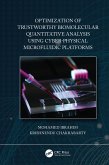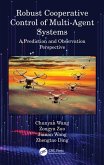Mohamed Ibrahim, Krishnendu Chakrabarty
Optimization of Trustworthy Biomolecular Quantitative Analysis Using Cyber-Physical Microfluidic Platforms (eBook, ePUB)
47,95 €
47,95 €
inkl. MwSt.
Sofort per Download lieferbar

24 °P sammeln
47,95 €
Als Download kaufen

47,95 €
inkl. MwSt.
Sofort per Download lieferbar

24 °P sammeln
Jetzt verschenken
Alle Infos zum eBook verschenken
47,95 €
inkl. MwSt.
Sofort per Download lieferbar
Alle Infos zum eBook verschenken

24 °P sammeln
Mohamed Ibrahim, Krishnendu Chakrabarty
Optimization of Trustworthy Biomolecular Quantitative Analysis Using Cyber-Physical Microfluidic Platforms (eBook, ePUB)
- Format: ePub
- Merkliste
- Auf die Merkliste
- Bewerten Bewerten
- Teilen
- Produkt teilen
- Produkterinnerung
- Produkterinnerung

Bitte loggen Sie sich zunächst in Ihr Kundenkonto ein oder registrieren Sie sich bei
bücher.de, um das eBook-Abo tolino select nutzen zu können.
Hier können Sie sich einloggen
Hier können Sie sich einloggen
Sie sind bereits eingeloggt. Klicken Sie auf 2. tolino select Abo, um fortzufahren.

Bitte loggen Sie sich zunächst in Ihr Kundenkonto ein oder registrieren Sie sich bei bücher.de, um das eBook-Abo tolino select nutzen zu können.
This book creates a new research field as it bridges the technical skills gap between microfluidic systems and molecular biology protocols but viewed from the perspective of an electronic/systems engineer.
- Geräte: eReader
- mit Kopierschutz
- eBook Hilfe
Andere Kunden interessierten sich auch für
![Optimization of Trustworthy Biomolecular Quantitative Analysis Using Cyber-Physical Microfluidic Platforms (eBook, PDF) Optimization of Trustworthy Biomolecular Quantitative Analysis Using Cyber-Physical Microfluidic Platforms (eBook, PDF)]() Mohamed IbrahimOptimization of Trustworthy Biomolecular Quantitative Analysis Using Cyber-Physical Microfluidic Platforms (eBook, PDF)47,95 €
Mohamed IbrahimOptimization of Trustworthy Biomolecular Quantitative Analysis Using Cyber-Physical Microfluidic Platforms (eBook, PDF)47,95 €![Metaheuristics for Resource Deployment under Uncertainty in Complex Systems (eBook, ePUB) Metaheuristics for Resource Deployment under Uncertainty in Complex Systems (eBook, ePUB)]() Shuxin DingMetaheuristics for Resource Deployment under Uncertainty in Complex Systems (eBook, ePUB)49,95 €
Shuxin DingMetaheuristics for Resource Deployment under Uncertainty in Complex Systems (eBook, ePUB)49,95 €![Robust Cooperative Control of Multi-Agent Systems (eBook, ePUB) Robust Cooperative Control of Multi-Agent Systems (eBook, ePUB)]() Chunyan WangRobust Cooperative Control of Multi-Agent Systems (eBook, ePUB)49,95 €
Chunyan WangRobust Cooperative Control of Multi-Agent Systems (eBook, ePUB)49,95 €![Cyber Security Solutions for Protecting and Building the Future Smart Grid (eBook, ePUB) Cyber Security Solutions for Protecting and Building the Future Smart Grid (eBook, ePUB)]() Cyber Security Solutions for Protecting and Building the Future Smart Grid (eBook, ePUB)105,95 €
Cyber Security Solutions for Protecting and Building the Future Smart Grid (eBook, ePUB)105,95 €![Hybrid Power Cycle Arrangements for Lower Emissions (eBook, ePUB) Hybrid Power Cycle Arrangements for Lower Emissions (eBook, ePUB)]() Hybrid Power Cycle Arrangements for Lower Emissions (eBook, ePUB)48,95 €
Hybrid Power Cycle Arrangements for Lower Emissions (eBook, ePUB)48,95 €![Autonomous Safety Control of Flight Vehicles (eBook, ePUB) Autonomous Safety Control of Flight Vehicles (eBook, ePUB)]() Xiang YuAutonomous Safety Control of Flight Vehicles (eBook, ePUB)50,95 €
Xiang YuAutonomous Safety Control of Flight Vehicles (eBook, ePUB)50,95 €![Control Basics for Mechatronics (eBook, ePUB) Control Basics for Mechatronics (eBook, ePUB)]() John BillingsleyControl Basics for Mechatronics (eBook, ePUB)31,95 €
John BillingsleyControl Basics for Mechatronics (eBook, ePUB)31,95 €-
-
-
This book creates a new research field as it bridges the technical skills gap between microfluidic systems and molecular biology protocols but viewed from the perspective of an electronic/systems engineer.
Hinweis: Dieser Artikel kann nur an eine deutsche Lieferadresse ausgeliefert werden.
Dieser Download kann aus rechtlichen Gründen nur mit Rechnungsadresse in A, B, BG, CY, CZ, D, DK, EW, E, FIN, F, GR, HR, H, IRL, I, LT, L, LR, M, NL, PL, P, R, S, SLO, SK ausgeliefert werden.
Hinweis: Dieser Artikel kann nur an eine deutsche Lieferadresse ausgeliefert werden.
Produktdetails
- Produktdetails
- Verlag: Taylor & Francis eBooks
- Seitenzahl: 363
- Erscheinungstermin: 31. Mai 2020
- Englisch
- ISBN-13: 9781000082708
- Artikelnr.: 59554450
- Verlag: Taylor & Francis eBooks
- Seitenzahl: 363
- Erscheinungstermin: 31. Mai 2020
- Englisch
- ISBN-13: 9781000082708
- Artikelnr.: 59554450
- Herstellerkennzeichnung Die Herstellerinformationen sind derzeit nicht verfügbar.
Mohamed Ibrahim was a Visiting Scholar with the Technical University of Munich, Germany, and the University of Bremen, Germany. He spent a total of three years as a Research and Development Engineer in the semiconductor industry where he worked on design-for-test and post-silicon validation methodologies for several system-on-chip (SoC) designs. His current research interests include SoC design and embedded systems, electronic design automation of LOC systems, Internet-of-Bio-Things, security and trust of bio-systems, and machine-learning applications of bio-systems. Dr. Ibrahim was a recipient of the Best Paper award at the 2017 IEEE/ACM Design, Automation, and Test in Europe Conference, the 2017 Postdoc Mobility award from the Technical University of Munich, Germany, two ACM conference travel awards from ACM-SIGBED in 2016 and ACM-SIGDA in 2017, and Duke Graduate School Fellowship in 2013.
Krishnendu Chakrabarty is the William H. Younger Distinguished Professor and Department Chair of Electrical and Computer Engineering, and Professor of Computer Science, at Duke University. He is a recipient of the National Science Foundation CAREER award, the Office of Naval Research Young Investigator award, the Humboldt Research Award from the Alexander von Humboldt Foundation, Germany, the IEEE Transactions on CAD Donald O. Pederson Best Paper Award (2015), the ACM Transactions on Design Automation of Electronic Systems Best Paper Award (2017), and over a dozen best paper awards at major conferences. He is also a recipient of the IEEE Computer Society Technical Achievement Award (2015), the IEEE Circuits and Systems Society Charles A. Desoer Technical Achievement Award (2017), the Semiconductor Research Corporation Technical Excellence Award (2018), and the Distinguished Alumnus Award from the Indian Institute of Technology, Kharagpur (2014). Prof. Chakrabarty's current research projects include: testing and design-for-testability of integrated circuits and systems; digital microfluidics, biochips, and cyberphysical systems; data analytics for fault diagnosis, failure prediction, anomaly detection, and hardware security; neuromorphic computing systems.
Krishnendu Chakrabarty is the William H. Younger Distinguished Professor and Department Chair of Electrical and Computer Engineering, and Professor of Computer Science, at Duke University. He is a recipient of the National Science Foundation CAREER award, the Office of Naval Research Young Investigator award, the Humboldt Research Award from the Alexander von Humboldt Foundation, Germany, the IEEE Transactions on CAD Donald O. Pederson Best Paper Award (2015), the ACM Transactions on Design Automation of Electronic Systems Best Paper Award (2017), and over a dozen best paper awards at major conferences. He is also a recipient of the IEEE Computer Society Technical Achievement Award (2015), the IEEE Circuits and Systems Society Charles A. Desoer Technical Achievement Award (2017), the Semiconductor Research Corporation Technical Excellence Award (2018), and the Distinguished Alumnus Award from the Indian Institute of Technology, Kharagpur (2014). Prof. Chakrabarty's current research projects include: testing and design-for-testability of integrated circuits and systems; digital microfluidics, biochips, and cyberphysical systems; data analytics for fault diagnosis, failure prediction, anomaly detection, and hardware security; neuromorphic computing systems.
1. Introduction. 2. Synthesis for Multiple Sample Pathways: Gene
Expression Analysis. 3. Synthesis of Protocols with Temporal Constraints: Epigenetic Analysis. 4. A Micro fluidics
Driven Cloud Service: Genomic Association Studies. 5. Synthesis of Protocols with Indexed Samples: Single
Cell Analysis. 6. Timing
Driven Synthesis with Pin Constraints: Single
Cell Screening. 7. Synthesis for Parameter
Space Exploration: Synthetic Bio
circuits. 8. Fault
Tolerant Realization of Biomolecular Assays. 9. Security Vulnerabilities of Quantitative
Analysis Frame
works. 10. Security Countermeasures of Quantitative
Analysis Frame
works. 11. Conclusion and Future Outlook. Appendix A Proof of Theorem 5.1: A Fully Connected Routing Crossbar. Appendix B Modeling a Fully Connected Routing Crossbar. Appendix C Proof of Lemma 6.1: Derivation of Control Delay Vector. Appendix D Proof of Theorem 6.1: Derivation of Control Latency. Appendix E Proof of Lemma 7.1: Properties of Aliquot
Generation Trees. Appendix F Proof of Theorem 7.1: Recursion in Aliquot
Generation Trees. Bibliography.
Expression Analysis. 3. Synthesis of Protocols with Temporal Constraints: Epigenetic Analysis. 4. A Micro fluidics
Driven Cloud Service: Genomic Association Studies. 5. Synthesis of Protocols with Indexed Samples: Single
Cell Analysis. 6. Timing
Driven Synthesis with Pin Constraints: Single
Cell Screening. 7. Synthesis for Parameter
Space Exploration: Synthetic Bio
circuits. 8. Fault
Tolerant Realization of Biomolecular Assays. 9. Security Vulnerabilities of Quantitative
Analysis Frame
works. 10. Security Countermeasures of Quantitative
Analysis Frame
works. 11. Conclusion and Future Outlook. Appendix A Proof of Theorem 5.1: A Fully Connected Routing Crossbar. Appendix B Modeling a Fully Connected Routing Crossbar. Appendix C Proof of Lemma 6.1: Derivation of Control Delay Vector. Appendix D Proof of Theorem 6.1: Derivation of Control Latency. Appendix E Proof of Lemma 7.1: Properties of Aliquot
Generation Trees. Appendix F Proof of Theorem 7.1: Recursion in Aliquot
Generation Trees. Bibliography.
1. Introduction. 2. Synthesis for Multiple Sample Pathways: Gene
Expression Analysis. 3. Synthesis of Protocols with Temporal Constraints: Epigenetic Analysis. 4. A Micro fluidics
Driven Cloud Service: Genomic Association Studies. 5. Synthesis of Protocols with Indexed Samples: Single
Cell Analysis. 6. Timing
Driven Synthesis with Pin Constraints: Single
Cell Screening. 7. Synthesis for Parameter
Space Exploration: Synthetic Bio
circuits. 8. Fault
Tolerant Realization of Biomolecular Assays. 9. Security Vulnerabilities of Quantitative
Analysis Frame
works. 10. Security Countermeasures of Quantitative
Analysis Frame
works. 11. Conclusion and Future Outlook. Appendix A Proof of Theorem 5.1: A Fully Connected Routing Crossbar. Appendix B Modeling a Fully Connected Routing Crossbar. Appendix C Proof of Lemma 6.1: Derivation of Control Delay Vector. Appendix D Proof of Theorem 6.1: Derivation of Control Latency. Appendix E Proof of Lemma 7.1: Properties of Aliquot
Generation Trees. Appendix F Proof of Theorem 7.1: Recursion in Aliquot
Generation Trees. Bibliography.
Expression Analysis. 3. Synthesis of Protocols with Temporal Constraints: Epigenetic Analysis. 4. A Micro fluidics
Driven Cloud Service: Genomic Association Studies. 5. Synthesis of Protocols with Indexed Samples: Single
Cell Analysis. 6. Timing
Driven Synthesis with Pin Constraints: Single
Cell Screening. 7. Synthesis for Parameter
Space Exploration: Synthetic Bio
circuits. 8. Fault
Tolerant Realization of Biomolecular Assays. 9. Security Vulnerabilities of Quantitative
Analysis Frame
works. 10. Security Countermeasures of Quantitative
Analysis Frame
works. 11. Conclusion and Future Outlook. Appendix A Proof of Theorem 5.1: A Fully Connected Routing Crossbar. Appendix B Modeling a Fully Connected Routing Crossbar. Appendix C Proof of Lemma 6.1: Derivation of Control Delay Vector. Appendix D Proof of Theorem 6.1: Derivation of Control Latency. Appendix E Proof of Lemma 7.1: Properties of Aliquot
Generation Trees. Appendix F Proof of Theorem 7.1: Recursion in Aliquot
Generation Trees. Bibliography.







